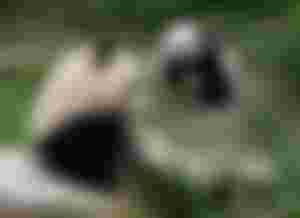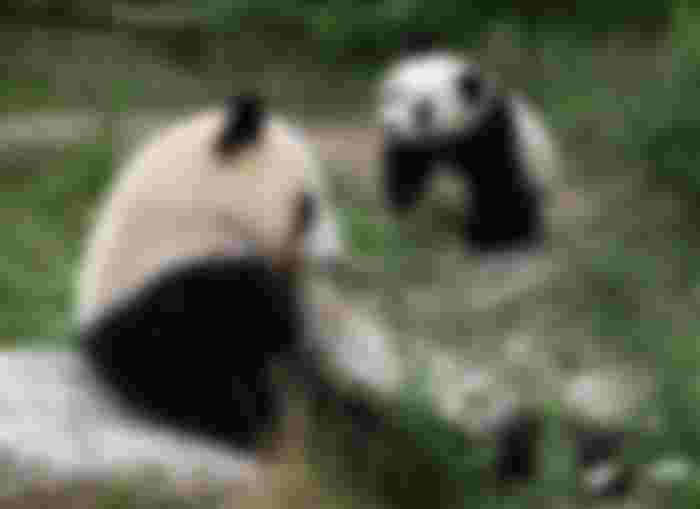Pandas are born as tiny, pink, wrinkled and blind creatures that whine.
How then do they grow into soft furry black and white balls that people just adore?
Scientists need six week to discovered the sex of a newborn panda. The sex was discovered by a genetic test and - it's a boy. The genetic test was done during the first veterinary examination in September, a full month after the birth on August 21. A genetic test is the only way to find out the sex of a panda cub in the first weeks of life, not only because mothers are extremely protective, but also because pandas are born without genitals.

Helpless newborns
Pandas are born fragile and undeveloped. It weighs between 85 and 150 grams, which is 1/900 of the mother's weight. This places them among the tiniest newborns in mammals compared to their mothers: human mothers are about 20 times heavier than their babies, while mother killer whales are 50 times heavier than their babies. Only bagpipers are smaller than pandas, which, after being born, complete their development in their mother's bag (the weight of a red kangaroo cub is 1 / 100,000 of the mother's weight).
Researchers do not know for sure why pandas are born so small. In December 2019, a study published in the Journal of Anatomy examined the skeletal structure of giant pandas and their cousin bears, which also tend to be born small compared to their mothers. The study found that the reason for this is the shorter gestation period in pandas compared to other bear species. Since the gestation period, ie the time spent in the uterus is shorter, when they are born, their skeleton is still not developed.
Short pregnancy probably has to do with diet, that is, with bamboo, which makes up the largest part of this bear's diet. For that reason, instead of spending a lot of energy necessary for the development of the fetus in the uterus, panda mothers dedicate themselves to creating milk with a high percentage of fat, so that their cubs can develop outside the uterus.


Newborn pandas rely on their mother for milk and protection because they cannot see, hear or crawl. They are so helpless that in the first weeks of life they cannot regulate their body temperature on their own or empty themselves. The mother takes care of all this by holding her cub to warm him and rubbing his stomach to stimulate the intestines to expel feces. In the first weeks after birth, panda mothers do not leave their cubs, even when they need to eat or drink. Motherhood is such a demanding job for giant pandas that those mothers who give birth to twins can often take care of only one thing - while, in the wild, they are forced to leave the other.
They are progressing quickly
Although they do not develop much in the womb, panda cubs make up for it quickly when they are born. In the next 48 hours, the pink skin begins to be covered with white and black fur.
Within three weeks, their fur grows almost completely.
They also gain weight quickly, which is not surprising, because they suck their mother's milk 14 times a day.
Newborn panda gained about 50 percent of her body weight at birth between the first two measurements, which took place less than a week apart.
After about a month of holding the baby throughout the day, mothers begin to slowly place the cub on the ground, and leave it to take a break for food and water.
As soon as the mother starts to separate from the cub for a long time, it means that it has just started to regulate the body temperature and that it is okay if it is left alone for a while.
At six weeks, they begin to open their eyes, and by the second month, their ear canals also open. Around the third or fourth month, their genitals begin to develop and they can finally defecate on their own and urinate.
They start crawling, their teeth grow, they even start biting bamboo, which signals that they are ready for the next phase of life.
Approaching adulthood
Pandas begin to become independent and separate from their mothers when they are about five months old. Then, for the first time, they leave the lair and learn to walk, climb and eat solid food. After the age of five months, the panda cub has developed cognitively to the extent that they can start training that will enable them to vaccinate the animal and conduct all health examinations (including blood sampling).
Once vaccinated, the cub can go with the mother to explore the environment. Very quickly, he starts climbing trees on his own - which is very important for pandas, because he is safe on the tree while his mother goes to get food. Although his mother's milk is still the basis, he starts eating bamboo and other foods at the age of six months.
By the first birthday, a panda cub can weigh as much as 75 kilograms. When he turns one and a half or two, the panda is ready to separate from its mother. Until they become sexually mature, which happens at the age of four in females, and at the age of six in males, nothing else changes significantly - except that they grow. Adult giant pandas can weigh up to 300 kilograms.

Thank you for your patience!
I hope you like this article...
Cheers!




Oh God how cute they are when they are little